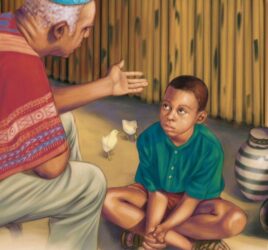My friend has OCD (Obsessive Compulsive Disorder). He has also been an effective missionary for about 20 years. He has recently emailed a large number of friends and colleagues to make known his OCD which mostly till now he has kept hidden. Notice that I did not write that he is OCD. He is not defined by this; there is far more to who he is and his capacities to serve God than just OCD even though his OCD is quite severe.
For me, his recent email has brought to mind the many I have known over the years who faithfully and effectively served God as expatriates: teachers, pastors, relief and development workers, missionaries, consultants, counselors, business people, leaders and managers, and so on. And yet so many also carried with them various ailments and disabilities. Some were physical, some medical, some psychological and emotional, some sexual, some cultural, some relational, and some spiritual. Whatever the nature of the weaknesses, these were people who kept on learning about themselves and honestly faced the truth. They were people who set out to manage their lives accordingly.
Not unusual challenges included:
- Some needed anti-depressant medication regularly.
- Some struggled with habits of negativity, pessimism, and judgmental-ism.
- Some never seemed to be able to move beyond a range of sexual issues.
- Some were socially inept or strongly reclusive; limited in interpersonal relationships.
- Some often found themselves twisted by low-self esteem which undermined their freedom to engage well with God.
- Some endured with the memories of past traumas and abuse.
- Some lived with the grief of divorce and other broken relationships.
- Some operated in toxic environments or with toxic leaders that debilitated them.
- Some lived with the consequences of alcoholic parents and upbringing.
- Some experienced the recurring temptations of substance abuse.
- Some found that their spiritual lives never seemed to fit into the typical expectations of most Evangelicalism.
I have left out the various physical challenges from cancer and arthritis, to dysfunctional digestive systems and thyroid issues. I have left out the common relationship issues such as difficult marriages and loneliness. Then there are the standard realities impacting us all, anger, hurts and fears, often very deep and very strong.
There were also such persons as:
- The teacher who was somewhat autistic.
- The cross-dresser with other strange habits.
- The missionary who everyone thought was being demonised until a wise counsellor figured out that a deep grief was the cause of dysfunction.
- The missionary who believed she was a murderer because she had two abortions earlier in life.
Yet, perhaps not surprising at all, each of those who come to mind, even with these issues, also managed to be faithful servants of God. Somehow God managed to work out good things for the Kingdom through each of them!!
Please note this well! So many people with a range of liabilities who nevertheless set out to serve Jesus and the Kingdom in various roles in another country. God blessed them with effectiveness!! Gifting through the Holy Spirit did not cancel out these vulnerabilities: and these liabilities did not cancel out the equipping for ministry by the Holy Spirit. As they were weak, so God was strong. His grace seemed to flow most abundantly when His people set out to serve Him even though they lived with such a variety of thorns in the flesh. 2 Corinthians 12:7-12 radically shifts the focus from our handicaps to the great gift of Christ’s strength and capacity. It is not about how well we perform and how much we achieve (these are oppressive masters) but how well we rest in the grace and sufficiency of Christ. We are indeed mere jars of clay. We do well to often read 1 Corinthians 1:26-2:5. Perhaps 2 Corinthians 10:10 suggests that Paul had his fair share of emotional challenges, Timothy certainly did (2 Timothy 1:6-7). In knowing our weakness, we trust so much more in the strength, wisdom and grace of God.
Fundamental to the effectiveness of these servants of God is knowing oneself well. Self-awareness is essential for effective ministry. Honestly facing the truth about oneself is the essence of humility and humility is at the heart of faithfulness in serving God. Attempts to serve without knowing oneself often result in ministry that grows out of unhelpful inner agendas and strong psychological habits that break down rather than build up. With self-awareness of the warts-and-all kind come a number of benefits. Knowing the flaws within oneself usually increases compassion and gentleness towards others. Knowing these flaws increases reliance on God, because there is no point relying on one’s own capacities! Knowing these flaws enables us to design personal strategies for self-management and growth that are based in reality, not hyper-spiritual idealism. Knowing these flaws increases one’s understanding of just what it means for God to love, delight in, care for, stand by, protect, equip, extend mercy, and persevere in transforming us into the restored persons we will be in the new heaven and earth.
Yet, we have all come across persons who are attempting to serve in other countries but for whom we have little doubt they don’t fit. It would be best if they went home – and soon. They have too much inner baggage, or they lack the capacity to address the issues of life and work in a cross-cultural context, or they are unteachable lone-rangers, or sometimes simply the wrong fit for the work they are trying to do. We all know of mission agencies, Christian NGOs, churches, as well as a wide variety of secular entities, which have displayed quite inadequate recruitment policies and practices. Some Christian recruiters seem to lack basic insights into the significance of these issues. Or simply lack the capacity to identify them. Or if they do identify them lack the courage to say “No”. In some cases, Christians get caught up in a kind-of euphoria, “If a Christian feels called to serve overseas, then it must be of God and it must be good!”
An opposite risk is in being too prescriptive of what we all should be like to serve God. Here the risk is a kind-of narrow legalism as to what healthy servants of God should be, a kind-of spiritual political-correctness. Sometimes we don’t appreciate just how much the diversity of personalities contribute to a great diversity in how Christian maturity and psychological health are processed and practiced. Often this legalism is driven by too little appreciation as to how much we have been shaped in such things by our own cultural background. Emotional maturity is too easily measured by culture rather than Scripture. Culturally shaped expectations for emotional expression and health, influence the way Scripture is read and understood. For example, contemporary meanings of words of emotion are assumed to be what the words meant 2 millennia ago.
Similarly, so often this comes from a neglect of just how much culture, including Evangelical culture, impacts on our understanding of psychological health and processing. Too readily, this generates a tendency to imagine that only people who have resolved their issues, usually in a very particular way, should be sent to serve in other countries. We probably all have heard someone say that personal issues like these should be resolved “before” setting out to serve God. In Scripture it is more about serving God with the personal weaknesses and vulnerabilities. The best of Christian piety is not in having personal issues resolved but in faithfulness to God knowing full-well how much baggage each of us carries – and learning to manage the baggage even as one works towards God’s liberation from the baggage. And we all know that only in death and resurrection does this complete liberation occur.
One of the great experiences of IC life and fellowship is when Christians of very different piety traditions discover that others from different traditions are equally devoted to Christ, equally faithful in serving in mission, equally effective. Reserved Brits and exuberant Americans discover how much they have in common, Pentecostals and non-Pentecostals likewise. Africans and Europeans may be very different culturally, and in spiritual expression, but both discover in the other the sincerity of devotion to Christ. Koreans and Australians are at the opposite ends of the spectrum regarding hierarchy and status, but each can learn from the other how mature faith and piety can be lived out in mission.
Such experiences increase our insight into our own cultural background and assumptions: and just how much culture has shaped our expectations regarding emotional, psychological and spiritual health and practice. But we need to engage well across the spectrum of cultures to really get the message. We need to be open to all the people within God’s family who bring a wealth of diversity, of culture, of spirituality, of approaches to life, to all aspects of faith and mission.
Searching out who is suitable for serving God cross-culturally needs to give due weight to self-awareness; personal liabilities, failures, weaknesses, flaws, vulnerabilities, limitations, fears. This is not an alternative to looking at strengths and capacities; of course these are important, but so is the baggage we bring to the service of God. How well does the person know himself or herself?? And given what they have learned so far, what have they already done to address the issues, to seek God’s healing, and what healing has happened so far? What strategies do they have in place to manage the weaknesses that continue? Maturity is in knowing oneself and in responsible strategies for self-management. Maturity is knowing you still have a long way to go (Philippians 3:12-16)!
Of course, in all things mistakes are made. Evidence of failure is not necessarily evidence of a flawed understanding of these issues. All the flawed people I know, including myself, have made their fair share of mistakes. But so have all the people I know who were sent out on mission having passed well the most stringent recruitment criteria (sometimes their over-confidence is their biggest stumbling block!). People who struggled spiritually and emotionally have served God effectively and those who seemed to have their act together have failed, and vice-versa. Mistakes are made both ways. It is so often not black and white but a judgement call, very much driven by intuition, wisdom and experience.
Herein lies the challenge for those responsible for appointing leaders and pastors to position in ICs. We must hold together the ideals together with the realities: the very desirable qualities and Biblical standards of IC leaders together with the realities of being flawed and vulnerable. There is no magic formula that rescues us from this tension; ultimately a healthy tension. Mistakes mostly come from inadequate attention to both areas, usually too little understanding of the weaknesses and their potential influences in ministry. It is with both realities well understood about each candidate that we can responsibly engage with the Holy Spirit in the process, “It seemed good to the Holy Spirit and to us not to burden you with anything beyond the following requirements” (Acts 15:28). The Holy Spirit works best when we give him good material to work with. The still, small voice of the Spirit is fundamental to discerning how, in our decision-making, we hold together the realities of both human frailty and the ideals of leadership capacities for the IC.
MICN is exploring the question of the essential DNA of an IC leader. What are the essential qualities and capacities for an effective IC leader, especially a missional leader? And in what ways might this be different for IC leaders compared to leaders in our home churches? What do you think?
We would love to receive your input! What do you think are the primary ingredients for effective missional leadership in an IC? In each of the following areas, what do you think an IC pastor needs as a minimal requirement? Attitude, baggage, thinking, culture, adaptability, politics, mission, leadership, theology, spirituality? What have we left out of this list? admin@micn.org
What are your thoughts as to how human weakness, vulnerability, brokenness, and frailty are also an essential requirement for ministry?
It is so easy to be idealistic; to write up a long list of requirements that are all good but have the result of no one ever being able to qualify! We need to hold together as best we can the realities of being human, flawed and limited, with the criteria that describe the best an IC leader can be. But above all, owning the truth that the worst we can be will not prevent our God completing every single detail needed for the Kingdom to be perfect and complete.
Graham Chipps



